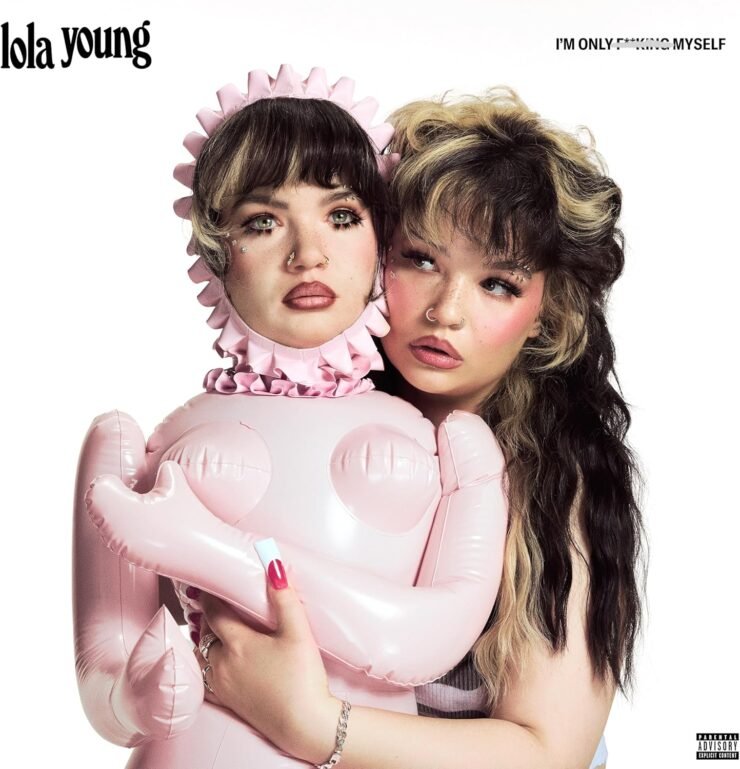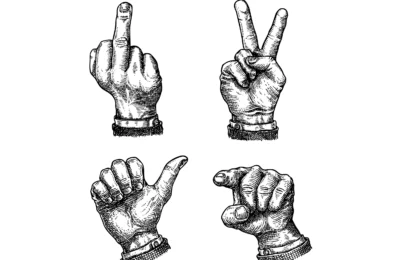Lola Young has been around for a few years already. After relative success in TV talent shows, she signed her first deal right before covid. So she had to stand strong and capitalise on the Internet at first with online performance to stay active. After a low-key debut album, she became internationally famous after her single “Messy” became a TikTok sensation. Suddenly she was everywhere. Like many, this is how I discovered here. I’m not one to fall much for a hit on the radio these days, but this one particularily appealed to me. The warm strong voices, the powerful lyrics and the gritty slow burn production… It just had a lot going for it. Her sophomore album This Wasn’t Meant For You was just as good… So I was waiting her new album, curious to see where she’d head next.
Young has never been one to sugarcoat, but with I’m Only F**ing Myself she sharpens her honesty into something rawer, wilder, and more self-aware than ever before.She plants her flag firmly in a grittier, guitar-driven territory that echoes 90s Britpop and alt-rock while still sounding unmistakably her own. This is the soundtrack of someone clawing their way out of toxic love, rebuilding in the rubble, and unapologetically enjoying the chaos along the way. At its core, the album is about contradictions — the freedom of sex and the weight of vulnerability, the damage of toxic relationships and the strength found in survival, the blur between hurting and healing. The result is an emotional rollercoaster, one that refuses tidy narratives in favor of lived messiness.
Anthems of Defiance
From the start, Young sets the tone with “F**k Everyone”. Pulsing bass and jerky vocal loops launch into a swaggering anthem of sexual freedom, one that casually shrugs off gender lines while reclaiming pleasure as power. It’s a modern heir to Blur’s Girls and Boys, but darker, dirtier, and more blunt. It instantly relegates “Messy” to yesterday’s news.
“D£aler”, one of the album’s sharpest singles, rides a driving rhythm and bouncy guitars to explore addiction in its many forms — substances, infatuation, self-sabotage. It’s both catchy and confessional, a duality that has already caught attention beyond her core fanbase. Meanwhile, “Walk All Over You” feels like a direct sequel to “Messy”, pulling us back into the push-and-pull of co-dependent, destructive love. These tracks set the tone, painting the portrait —through honesty and sarcasm — of a Lola Young done with love disillusion, burnt once too many, and favouring fleeting encounters over meaning.
Cracks in the Armor
But beneath the hard shell of the rebellious Young, you can still find some disarming frailty. “Spiders”, —a standout — is a slow burn, simmering ballad where Young drops her armour and asks her partner to “kill the spiders,” a metaphor for the doubts and fears that gnaw at intimacy. The electric intensity builds like an anxiety attack, making it one of her most vulnerable moment on the album.
“Post Sex Clarity” shifts gears into something softer. The song is a slow-dance ballad where Young is startled by her own attachment. In a record filled with liberated sexual bravado, it’s disarming to see her discover the quiet possibility that she can still want more. And “Sad Sob Story” — stripped down to acoustic bones — captures the universal feeling of rebuilding after heartbreak, refusing to be dragged down by an ex’s misery and instead finding joy in survival.
Darker Edges: Self-Destruction and Growth
The back half of the album gets heavier, digging into the shadowy corners of self-awareness. In “Can We Ignore It”, with its dirty bass and vibrating snare, Young confronts her own bad sides while dodging accountability. It bleeds naturally into “Why Do I Feel Better When I Hurt You”, a brutally candid track about the paradox of co-dependency. She admits being conscious of how her words can bruise, and how she can push buttons, and yet feeling better when doing so…
The closer, “Not Like That Anymore”, ties the whole album together. Here, Young reflects on how staying in an abusive relationship was its own form of self-betrayal, but also reclaims the phrase “f**king myself” as something liberating — making her own mistakes, owning them, and growing stronger because of it. It’s both a declaration of independence and a reminder that healing is messy.
Final Note
As usual, Lola Young is unapologetically herself — and that’s exactly how we like her. Often compared to Amy Winehouse, with whom she shares a manager, Young is clearly carving her own legend. “I’m Only F**ing Myself” is a powerful collection, full of sharp lyrics and 90s-inspired hooks that bounce between Britpop swagger and gritty alt-rock. There’s no let-up here. Brutal, funny, and painfully relatable, the album doesn’t offer neat resolutions, but instead captures the chaos of love, lust, and survival in real time. This is Lola Young: unfiltered, defiant one moment, tender the next, but always in control of her own story.


















